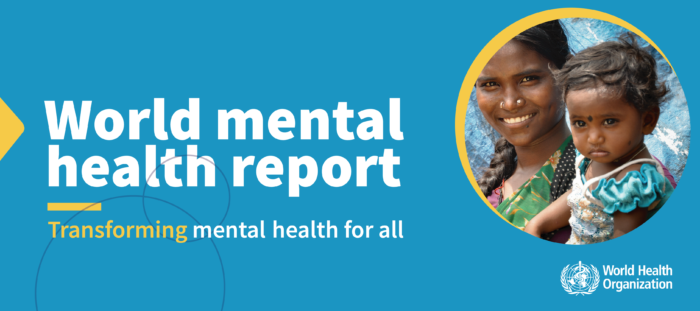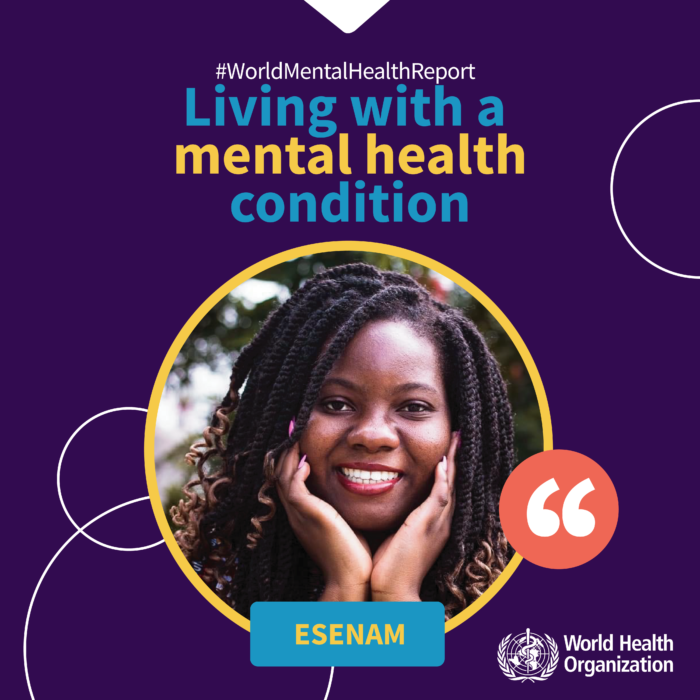For a Transformative Mental Health Approach: The New World Mental Health Report

Esenam lives in Ghana, and was diagnosed with bipolar disorder. Fearing COVID-19 infection, she waited almost a year before going to the clinic for therapy. Unemployed at the time, Esenam did not have enough funds for treatment. Her parents, thanks to their pension, ensured she could get her medications, but many others cannot.
The COVID-19 pandemic has been an unprecedented stressor to the mental health of many individuals. According to WHO, in 2020, COVID-19 had disrupted or, in some cases, halted critical mental health services in 93% of countries worldwide, while the demand for mental health support increased.

Global threats to mental health are ever present. Growing social and economic inequalities, protracted conflicts, violence and public health emergencies affect whole populations, threatening progress towards improved well-being.
Now, more than ever, business as usual for mental health care simply will not do.
It’s been just over twenty years since WHO published its landmark World Health Report 2001, Mental health: new understanding, new hope. It shone a light on mental health’s critical role in the well-being of individuals, communities, and countries. It laid bare the enormous public health and socioeconomic impacts of mental ill health and exposed a huge gap between people’s need for, and receipt of, care or treatment. The recommendations made remain valid today and WHO’s latest analysis of countries’ performance against the Comprehensive mental health action plan 2013-2030 shows that progress has been slow. Mental health conditions continue to exact a heavy toll on people’s lives, while mental health systems and services remain ill-equipped to meet people’s needs.
The new World Mental Health Report: Transforming mental health for all, is designed to inspire and inform the indisputable and urgent transformation required to ensure better mental health for all. Drawing on the latest evidence available, showcasing examples of good practice from around the world, and voicing people’s lived experience, the report highlights why and where change is most needed and how it can best be achieved.

In this report, WHO explores the principles and drivers in public mental health, its core concepts and determinants. In today’s world, why do we need a transformation in mental health? The report lays out the benefits of change, as well as the mechanisms and foundations to make it happen, from frameworks and financing to competencies. The last part of the report focuses on the restructuring of services to reach transformation; how to promote mental health for all, protect those at risk and provide mental health care in communities.
The World Mental Health Report calls on all stakeholders to work together to deepen the value and commitment given to mental health, reshape the environments that influence mental health, and strengthen the systems that care for mental health.
At the WHO Foundation, our mission is to support the work of WHO, as we start to focus on three strategic areas WHO identified to transform and scale up mental health services worldwide.
- Digital Mental Health Solutions
Building and deploying digital mental health tools reduces the cost of services and improves access to services for those who cannot see a health professional in person. The WHO Foundation, alongside the private sector, will explore support to digital interventions such as applications that use chatbot and websites for adolescents and youth experiencing psychological distress and digital interventions (apps and websites), both individual and group-based, designed for delivering support. - Creating Partnerships with Workplaces
The workplace is an obvious and largely untapped venue for the prevention of mental health conditions and promotion of mental health.
The working population spends a significant amount of daily time working and globally, 15% of working age adults are estimated to have a mental disorder. Prevention of mental health conditions and promotion of mental health requires a multisectoral effort and cannot be addressed by the health sector alone.
As such, WHO is developing standardized Mental Health Guidelines specifically for the workplace. By 2023, WHO will publish the first WHO return-on-investment (ROI) estimates for workplace mental health and a WHO document identifying “best buys”. The WHO Foundation will be working to support WHO in these efforts through support to identify private sector partners to pilot WHO’s “Mental Health Guidelines for the Workplace” to support industry by building a Community of Practice for mental health, that will lead a dialogue on current experience around mental health in the workplace and will support the introduction of the WHO guidelines on mental health at work in their organizations. Members of this Community will share lessons learned, feedback, and insights on the guidelines and on their implementation to help us shape the future of global mental health at work. As such, they will be seen as leaders in workplace mental health. - Partnering with Wellness and Sports for Mental Health
Mental health conditions continue to be highly stigmatized. Celebrities, professional athletes, and key influential individuals have recently started sharing their personal challenges with mental health, which can help break the mental health stigma that leaves so many people suffering in secret.
The WHO Foundation will mobilize key influencers as critical advocates to collaborate on public mental health awareness campaigns and initiatives that are backed by science and guidelines supported by WHO.
We are on a mission to marshal new resources from philanthropists, foundations, businesses, and individuals to support WHO and advance health through digital health solutions.
To get involved and partner with the WHO Foundation, please learn more on our website.

